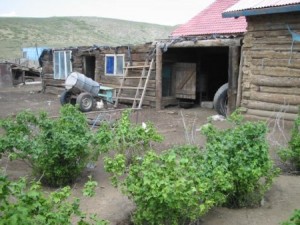The end of oil – stabilization – part #3
In the year 2057, the last of the oil, in any viable quantities, was pumped out of a small field in a remote region of Venezuela.¬† Venezuela had long since been invaded by a coalition force of Chinese and American military – before they turned¬†on each other.¬† Although their weaponry was superior, the Americans were defeated due to the lack of refined gasoline to operate their mobile armaments.¬† The Chinese won the field with massive manpower and small arms, neither of which required petrol.¬† This advantage eventually¬†turned on the Chinese as…¬†¬†¬† most of their army starved or succumbed to disease in an attempt to remove the oil from the Venezuelan jungle.
Between 2057 and 2059, the world population had dropped from 9 billion to 3 billion.¬† With no oil to provide sufficient energy, lack of food, medical services, clean water, sanitary conditions, disinfectants, and cold weather pummeled a “soft” population of office workers, social service dependees, and two generations of simpletons used to having their every need delivered to them as easily as a pizza, and paid for with Daddy’s money.
By the year 2080, things had begun to stabilize.¬† The world population continued to shrink, but more slowly, and finally bottomed out at 2 1/2 billion.¬† The Earth seemed able to accommodate this level of human occupation, especially without¬†man’s petroleum based polluters.¬† Global warming was no longer a serious threat, big city smog was a long past memory, and large scale starvation had¬†eliminated obesity as¬†America’s biggest health problem.
Europe and Japan recovered more quickly, in large part because of their railroad infrastructure.¬† Their electric trains were top priority for the electricity supplied by hydroelectric and¬†nuclear power plants, built before the 2057 apocalypse, and¬†were able to¬†transport food and¬†medical necessities¬†to their cities.¬† In the U.S., railroad infrastructure was never built in profusion, owing to Americans’ love of their automobile.¬†¬†However, most American train engines were converted to coal-fired steam locomotives, similar to the early nineteenth century, and were able to¬†provide large population centers with some food and supplies.¬† Recent memories, however,¬†led most Americans to shun large cities, preferring instead to revert back to the small farming communities of pre-Civil War times.¬† Many of these villages¬†sprung up¬†near¬†dams and nuclear power plants – once the “evil” of residential neighborhoods.
Village living became the norm in America.¬† Just as was the case in the early 1800′s, food came from individual or community gardens, protein was supplied¬†by small ranchers or “professional” hunters and trappers.¬† Seems the rise in the wildlife population was inversely proportional to the decline¬†of man’s.¬† Fish¬†was in abundance¬†from coastal villages, caught by sail powered fishing boats.¬† Although bartering for services¬†was common, food replaced gold and paper money as the currency of choice.
Not to say there was no electricity at all in the small settlements.  In every village, there was at least one entrepreneur who converted his corn or potato crop to moonshine.  Although a few cups always went missing from each batch, most went to supply ethanol enabled generators to provide a modicum of refrigeration for meat.
People worldwide began to gravitate to occupations of real use.  Complete industries had vanished.  No airline employees - no automobile workers - no lawyers - no stock brokers Рno social workers Рno bankers Рno insurance salesmen Рno government employees Рno postal workers Рno actors Рno professional athletes Рno valueless occupations.  Even prostitutes were looked upon as merely providing a needed service for men who had lost their families.  Recent memories of rat infested mountains of garbage accorded great respect for people charged with the disposal of trash.  Near reverence was bestowed on the farming profession and to men who tended domestic animals.  Reason triumphed over bias.
In less than 180 years, the world had grown from an agrarian society to one that¬†achieved¬†great technological feats.¬† Rather than build on this success, Earth’s citizens¬†killed each other over¬†ideological and religious differences …..¬†¬†and ….¬†the supply of¬†residue of long-dead dinosaurs that fueled a once great planet.¬† In the end, high-minded ideology surrendered to an overwhelming¬†need to simply find something to eat.
After 180 years, it was¬†right back where it all¬†started.¬† Self sufficiency, work ethic, helping one’s neighbor, clean air, and great honor in living a life that contributed, rather than consumed.
Back in the year 2000, most people feared mankind would vanish in a nuclear fireball from a war many felt was imminent, or a direct hit by an asteroid, or by holy wars, or by massive global warming.  In the end, mankind was nearly obliterated by dependence on a substance needed simply to move things from one place to another Рoil. 
“Think about it.”
And, that’s all I have to say about that.
Shambo


Ila 6th September 2014
I read a lot of interesting posts here. Probably you spend
a lot of time writing, i know how to save you a lot of time, there is an online tool that creates high quality, google friendly posts in minutes, just type in google – k2seotips unlimited content
Ronald 3rd July 2014
I see a lot of interesting posts on your blog.
You have to spend a lot of time writing, i know how to save you a
lot of work, there is a tool that creates unique, google friendly articles in couple of minutes, just search in google
- laranita’s free content source
shambo 24th March 2010
Phoebe,
Great suggestion. Let’s eat all the steak and leave the “twenty-somethings” to eat ‘possum when they are our age.
Shambo
Phoebe 24th March 2010
WOW,these thoughts that you put in writing aren’t ones that most people even want to think about. It is hard to be footloose and fancy free knowing obstacles of destruction could be right around the bend….so, after reading all 3-parts..and thinking on the lighter side…we should all forget the never ending dieting and eat like hell.